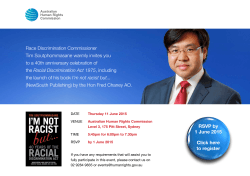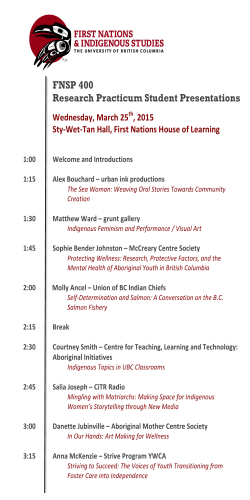
Caste featured in the EU EIDHR Annual Action Plan 2015
IDSN April 2015 EIDHR Annual Action Plan 2015 – references to caste The European Instrument for Democracy and Human Rights (EIDHR) is the principles vehicle for support to civil society activity in the promotion of human rights and democracy in non-EU countries. As of today the EIDHR is funding more than 1200 projects in over 100 countries. The Annual Action Programme 2015 for the European Instrument for Democracy and Human Rights (EIDHR), as set out in the Annexes, was approved on 1 April 2015. The following annexes of the Annual Action Plan 2015 include mention of caste: Annex 1. Supporting 110 Calls for Proposal targeting local civil society through Country Based Support Schemes (CBSS) Annex 2. Supporting Human Rights priorities – EIDHR global call 2015 Annex 3. Supporting Human Rights and their Defenders where they are the most at risk – EIDHR facility Annex 5. Supporting a global network of universities for human rights and democracy postgraduate education Annex 6. Supporting key international actors – UN Office of the High Commissioner for Human Rights Please find the extracts below. Annex 1 Action Document for Supporting 110 Calls for Proposals targeting local civil society through Country Based Support Schemes 3.1. Objectives: The objective of this action is to support civil society and human rights defenders in third countries in working on human rights (political, civil, economic, social and cultural), and democratisation, so as to: i) pursue common agendas for human rights and democratic reform; ii) build consensus on disputed or controversial areas of policy; iii) enhance political representation and participation; iv) enhance the inclusiveness and pluralism of civil society; v) increase safety structures for human rights defenders; vi) counter the worrying trends of shrinking space for civil society; vii) support activities aimed at promoting the issues covered by EU Human Rights guidelines and in the EUs Strategic Framework and Action Plan on Human Rights and Democracy; viii) enhance the rule of law and good governance. 3.2. Expected results and main activities: The local thematic priority setting under the Human Rights Country Strategies, as agreed by Delegations and Heads of Mission in the various countries, and local civil society consultations will provide guidance for the selection of relevant fields of intervention. Moreover, three key areas of the new EIDHR need to get further attention from EU Delegations, in order that the aggregated financial support is in line with the Multiannual indicative programming: Human Rights Defenders Economic and Social Rights Democracy support and promotion Examples of fields of intervention (where and when these match local priorities): support, protection and defence of human rights defenders; 1 IDSN April 2015 support the fight against impunity, in particular civil society actions ensuring the effective functioning of the International Criminal Court (ICC); supporting gender equality (women’s rights, women in decision-making, right to participate in peace-building and reconstruction processes, fight against violence and harmful practices, etc.); o supporting the rights of indigenous peoples e.g through activities to implement the Outcome document of the United Nations’ World Conference on Indigenous Peoples (September 2014) o Supporting rights of persons belonging to minorities, people affected by caste based discrimination, Lesbian/Gay/Bisexual/Transgender and Intersex (LGBTI) people and other vulnerable groups; (page 17) supporting freedom of expression and freedom of religion or beliefs, support to civil society organisations' actions and campaigns against the death penalty, against torture and other cruel, inhumane or degrading treatment or punishment; support for civil society organisations’ activities preparing the ground for elections (e.g. civic and voter education, domestic observation, dialogue and training for political actors) and post-election observation, including following up on the recommendations formulated by the EU or the OSCE/ODIHR Electoral Observation Missions (EOM). In such cases and where applicable, increased consistency with geographic election assistance programmes is needed; protection of the social, economic and cultural rights, especially for groups particularly vulnerable to discrimination, such as the poor, women, children, indigenous peoples, migrants and the rights of persons belonging to minorities. support for the structure and operation of trade unions, enabling social dialogue between different groups, developing mechanisms for exchange of opinions and democratic dialogue. 3.4. Cross-cutting issues: Cross-cutting issues for the implementation of this Action include: promotion of human rights, gender equality, democracy, good governance, conflict prevention, children's rights and indigenous peoples, environmental sustainability and combating HIV/AIDS, nondiscrimination, the rights of persons belonging to minorities, the rights of persons affected by caste based discrimination, the rights of persons with disabilities and other vulnerable groups (page 19). Annex 2 Action Document for Supporting Human Rights priorities This action will cover core priority themes in the form of five separated lots under the umbrella of an encompassing global call for proposals. These five lots will be recurrent to any of the upcoming EIDHR call for 2014-2017 and cover respectively Lot 1. Human rights and their defenders where they are the most at risk, Lot 2. Economic, Social and Cultural rights, Lot 3. Human Dignity, Lot 4. Discrimination and Lot 5. other priorities planned in the Multiannual programming or linked to new unforeseen areas. This 2015 global call will focus on a specific sub-area for each of these recurrent five lots respectively (i) Support to HRDs grass root organisations (ii) Contributing to the monitoring and the effective implementation of 27 core international conventions in the GSP+ context (iii) Death Penalty (iv) Migrants, Internally Displaced Persons and stateless persons (v) Children and armed conflict. 3.1. Objectives: The overall objective is to support civil society in its actions to support the promotion and protection of human rights and fundamental freedoms worldwide. Lot 1 – Supporting Human Rights and their Defenders where they are the most at Risk (This lot will focus on (i) Support to HRDs grass root organisations) 2 IDSN April 2015 Lot 2 – Supporting Economic, Social and Cultural rights (This lot will focus on (ii) supporting and empowering civil society actors in contributing to the monitoring and the effective implementation of the relevant 27 conventions ratified by GSP+ beneficiary countries, namely: El Salvador, Guatemala, Panama, Armenia, Bolivia, Costa Rica, Ecuador, Georgia, Peru, Cape Verde, Mongolia, Pakistan, Paraguay as well as any country that will join the GSP+ in the course of the call) Lot 3 – Supporting Human Dignity (This lot will focus on (iii) supporting civil society activities fighting against the death) Penalty). Lot 4 – Fighting discrimination (This lot will focus on (iv) supporting migrants including asylum seekers, internally displaced persons and stateless persons’ rights) Lot 5 – Supporting other priorities (MIPs) or new unforeseen areas. (This lot will focus on (v) supporting children in armed conflict as part of the population most affected by and vulnerable to armed violence.) 3.2. Expected results and main activities Lot 1 With the specific objective to contribute to support HRDs grass root organisations the following activities will be promoted: Regional activities using financial support to thirds parties as the main implementation modality targeting categories of HRDs at risk such as women HRDs, land rights and environmental rights defenders, HRDs who defend the rights of indigenous peoples and of persons belonging to minorities, people affected by caste based discrimination, trade unionists who promote labour rights, lawyers, journalists and others who promote fundamental freedoms, rights of lesbian, gay, bisexual, transgender and intersex (LGBTI), HRDs who work in remote areas, and HRDs who challenge violations of economic, social and cultural rights (page 33). 3.4. Cross-cutting issues: Cross-cutting issues for the implementation of this Action include: conflict: prevention, non-discrimination, the rights of persons belonging to minorities, the rights of persons with disabilities, the rights of persons with life-threatening diseases and other vulnerable groups, indigenous peoples, the empowerment of women, rights of people affected by caste based discrimination the rule of law (page 35). Annex 3 Action Document for Support to Human Rights and Human Rights Defenders in situations where they are most at risk – EIDHR Facility 3.4. Cross cutting issues: Cross-cutting issues for the implementation of this Action include: nondiscrimination, indigenous peoples’ rights, the rights of persons belonging to minorities, the rights of persons with disabilities, the rights of people affected by caste based discrimination, the rights of persons with life-threatening diseases and other vulnerable groups, core labour rights and social inclusion, the empowerment of women, the rule of law, capacity building for parliaments and civil society, and promoting dialogue, participation and reconciliation, as well as institution building, including at local and regional level (Page 42). 3 IDSN April 2015 Annex 5 Action Document for “Supporting a global network of universities for human rights and democracy postgraduate education” 3.4 Cross-cutting issues: Being a human rights action, cross-cutting schemes are at the heart of this programme. The rights of children, women, people with disabilities, indigenous peoples and persons belonging to minorities, rights of persons affected by caste based discrimination and the links between the environment and human rights, will all be taken into account throughout the implementation of the action (page 59). Annex 6 Action Document for “Supporting key international actors – UN Office of the High Commissioner for Human Rights” 3.4. Cross-cutting issues: The OHCHR directly targets the protection and promotion of all human rights for all people. Mainstreamed issues identified in the EIDHR Strategy are not only taken into account by the OHCHR, but are also the subject of specific activities: children, women, gender-based discrimination, Lesbian/Gay/Bisexual and Transsexual persons, people with disabilities, indigenous peoples, persons belonging to minorities and people affected by caste based discrimination (page 69). 4
© Copyright 2026









